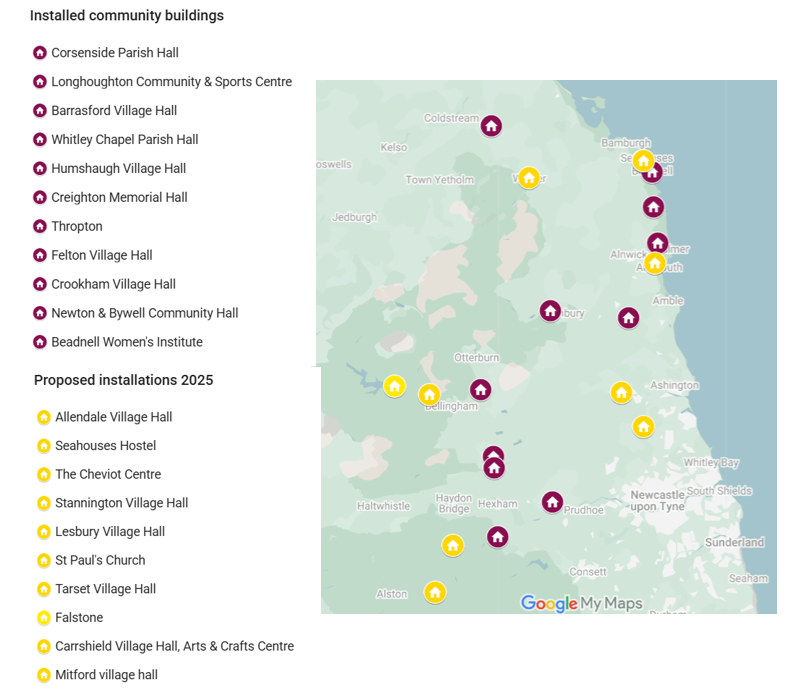Solar Powered Community Buildings

CAN is a partner in the Northumberland solar powered community buildings project which started in 2022 and has ambitious plans.
Northumberland Community Energy Ltd (NCEL for short), formed in 2023, is a not-for-profit Community Benefit Society operating as a cooperative. All participating buildings are eligible to become members.
Any surplus revenue generated by the society goes to service the community buildings that are part of the project.
Watch this video showcasing the project
Download 'How it Works' briefing
Download latest update - June 2025
Project aims
- Reduce energy costs for community buildings in Northumberland.
- Support resilience in response to long-term climate change and short-term events.
- Reduce carbon footprint of community activities.
- Generate revenue for community groups.
…all whilst limiting risk and maximising reward for community groups.
How?
The project will install solar PV panels onto the roofs of community buildings across rural Northumberland (village halls, churches, community-owned sports facilities, etc) alongside battery storage.
This will be achieved through NCEL, which will:
- Raise the capital funds for all installations and pre-development work (system design, planning, legal work etc) through a combination of grant and loan.
- Lease the roof space and space for equipment from each building.
- Put in place a power purchase agreement with each building to buy the solar generated electricity, used by the building, at a rate significantly discounted compared to market rates. When local generation from the panels is not available, each building will buy energy from the grid as usual.
- Insure and manage all installations for the duration of the lease period, including grid connection, metering and grid feed in.
Why?
We all need to reduce our carbon emissions – including community buildings. Greater use of self-generated energy will significantly reduce the running costs of community buildings, particularly important in times of rising and fluctuating energy costs.
In addition, Storms Arwen and Malik highlighted the potential impact of power cuts and loss of connection to the national grid. Battery storage of electricity enables power to be maintained until re-connection has been achieved – particularly important for those community buildings which act as formal ‘Emergency Rest Centres’ or ‘Community Response Hubs.’
The benefits for community buildings
- Reduced energy costs.
- Solar panels reduce carbon footprint.
- Local generation and storage increase resilience in case of adverse events.
- Co-op bids for grant funding and secures loan funding at preferential rates, allowing discounts on energy to community buildings.
- Co-op accesses preferential rates for installations.
- Co-op takes on all risk.
- Co-op is an Associate member of NEPO (the North East Purchasing Organisation), enabling members to obtain competitive quotes for energy supply through this bulk buying mechanism.
- Expert project manager, employed by CAN, manages installations and operation.
Contact Us
Fiona Knox - NCEL Project Officer
T: 07482258114
Progress to date
Using funding secured through the North East and Yorkshire Net Zero Hub, the National Lottery Community Fund and the Rural Asset Multiplier Pilot of the North East Combined Authority, we have:
- Installed solar panels and batteries into 11 community buildings and have a further 8 planned before the end of 2025.
- There are 18 buildings with a feasibility study and planning approval awaiting the next steps.
- Currently we have 58 buildings who have a completed solar installation feasibility study or awaiting their visit and report.
- In the last few months 8 community buildings have expressed an interest to join the project
- In total we are working with 95 buildings who are at various stages in the project.
- Continuing to apply for and secure funding to progress planning, legal agreements and structural surveys and other necessary permissions at a range of buildings, building the pipeline of installations.
- Established a waiting list of additional community buildings keen to join the project.
- Held a sharing event for interested community groups at Longhoughton Community & Sports Centre in November 2024. Held a joint Energy Roadshow with CAN at Newton & Bywell Village Hall on May 2025, reaching halls in the southern part of the county.
Our aim is to secure 100 installations over the next five years.
NCEL Solar-Powered Buildings Project
Powered by the sun and volunteers

Project Partners
This project has been developed in direct partnership between CAN, the Rural Design Centre and the National Innovation Centre for Rural Enterprise.
A steering group of participating buildings was established in 2022.
This project could not have been developed without the input from all three core partners and the community buildings themselves.
.jpg)

Fiona Knox
NCEL Project Officer
T: 07482258114 E: fionaknox@ca-north.org.uk